Related Research Articles

The First Battle of Bull Run, called the Battle of First Manassas by Confederate forces, was the first major battle of the American Civil War. The battle was fought on July 21, 1861, in Prince William County, Virginia, just north of the city of Manassas and about thirty miles west-southwest of Washington, D.C. The Union Army was slow in positioning themselves, allowing Confederate reinforcements time to arrive by rail. Each side had about 18,000 poorly trained and poorly led troops. The battle was a Confederate victory and was followed by a disorganized post-battle retreat of the Union forces.

Robert Gould Shaw was an American officer in the Union Army during the American Civil War. Born into a Boston upper class abolitionist family, he accepted command of the first all-black regiment in the Northeast. Supporting the promised equal treatment for his troops, he encouraged the men to refuse their pay until it was equal to that of white troops' wage.

William Calvin Oates was a colonel in the Confederate States Army during the American Civil War, the 29th Governor of Alabama from 1894 to 1896, and a brigadier general in the U.S. Army during the Spanish–American War.
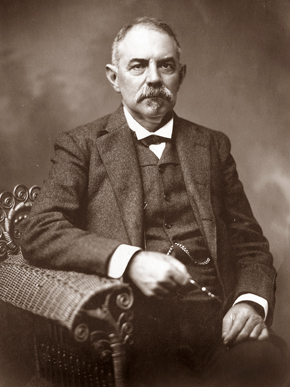
Thomas Goode Jones was an Alabama lawyer, politician, and military officer. He served in the Alabama legislature and as Governor of Alabama. He later became United States district judge of the United States District Court for the Middle District of Alabama and the United States District Court for the Northern District of Alabama.

John Daniel Imboden, American lawyer, Virginia state legislator, and a Confederate army general. During the American Civil War, he commanded an irregular cavalry force. After the war, he resumed practicing law, became a writer, and was active in land development founding the town of Damascus, Virginia.

William "Extra Billy" Smith was a lawyer, congressman, the 30th and 35th Governor of Virginia, and a major general in the Confederate States Army during the American Civil War. On his appointment in January 1863, at 65, Smith was the oldest Confederate general to hold field command in the war.
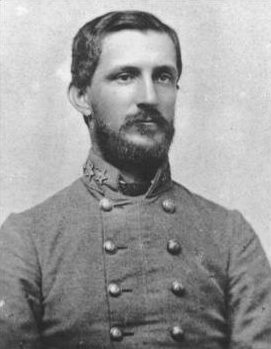
Robert Frederick Hoke was a Confederate major general during the American Civil War. He was present at one of the earliest battles, the Battle of Big Bethel, where he was commended for coolness and judgment. Wounded at Chancellorsville, he recovered in time for the defense of Petersburg and Richmond. His brigade distinguished itself at Cold Harbor, acknowledged by Grant as his most costly defeat. Hoke was later a businessman and railroad executive.

Robert Cumming Schenck was a Union Army general in the American Civil War, and American diplomatic representative to Brazil and the United Kingdom. He was at both battles of Bull Run and took part in Jackson's Valley Campaign of 1862, and the Battle of Cross Keys. He served two separate multi-term stints in the U.S. House of Representatives.
The 51st Georgia Infantry Regiment was an infantry regiment in the Confederate States Army during the American Civil War.
The Fighting McCooks were members of a family of Ohioans who reached prominence as officers in the Union Army during the American Civil War. Two brothers, Daniel and John McCook, and thirteen of their sons were involved in the army, making the family one of the most prolific in American military history. Six of the McCooks reached the rank of brigadier general or higher. Several family members were killed in action or died from their wounds. Following the war, several others reached high political offices, including governorships and diplomatic posts.
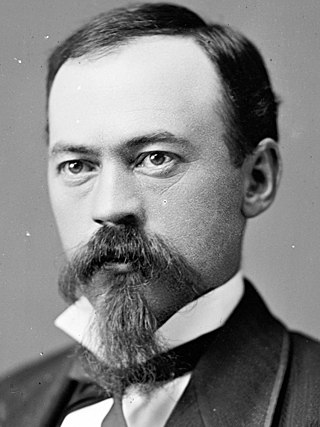
Charles Henry Morgan was an American lawyer and politician from Missouri. He represented Missouri in the United States House of Representatives for five terms spread across four decades. He also served as a United States Army officer in the American Civil War and the Spanish–American War.

Nathaniel Collins McLean, was a lawyer, farmer, and Union general during the American Civil War. He was appointed colonel of the 75th Ohio Infantry Regiment in 1861 and led the regiment in several battles before commanding a brigade. During the Second Battle of Bull Run, his brigade's determined defense of Chinn Ridge probably saved the Union Army from a disaster. He led a brigade at the Battle of Chancellorsville in 1863, for a month in the Atlanta campaign in 1864, and in the Carolina campaign in 1865. After the war, he returned to his law practice in Cincinnati, moved to Minnesota, and moved again to New York where he died.
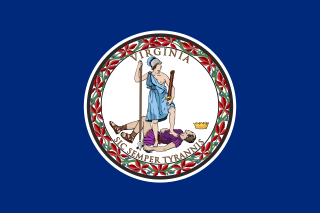
The 8th Virginia Infantry Regiment was a Confederate infantry regiment raised by Colonel Eppa Hunton in Leesburg, Virginia on May 8, 1861. The unit comprised six companies from Loudoun, two companies from Fauquier, one company from Fairfax and one company from Prince William. Initial regimental officers included: Lt. Colonel Charles B. Tebbs, Major Norborne Berkeley, John M. Orr - Quartermaster, Dr. Richard H. Edwards - Surgeon, Charles F. Linthicum - Chaplain. After Eppa Hunton's promotion to brigadier general in August 1863, in part based on his valor during the Battle of Gettysburg, particularly during Pickett's Charge, Norborne Berkeley was promoted to command the 8th Virginia, and his brother Edmund became the Lieut. Colonel, his brother William Berkeley, Major, and Charles Berkeley became the senior Captain of what then became known as the "Berkeley Regiment." Nonetheless, Norborne, William and Charles Berkeley were all in Union prisoner of war camps and their brother Edmund still recovering from his Gettysburg wound on August 9.
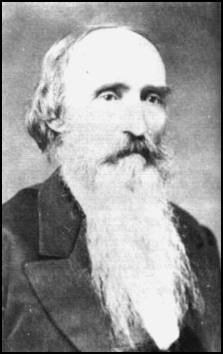
Claudius Wistar Sears was a United States Army officer, an educator, and a Confederate general during the American Civil War.
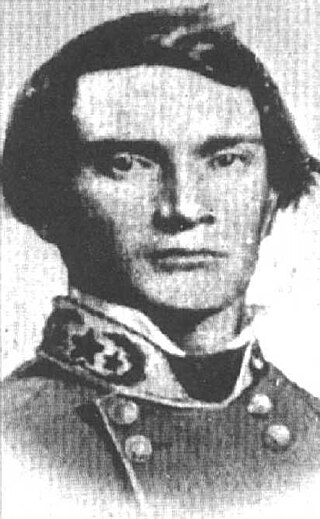
William Montgomery Gardner was a Confederate States Army brigadier general, during the American Civil War. Before the Civil War, he served in the U.S. Army for 15 years. He was a veteran of the Mexican–American War.

The 167th Infantry Regiment is an infantry regiment of the Alabama National Guard.
The following list is a bibliography of American Civil War Confederate military unit histories and are generally available through inter-library loan. More details on each book are available at WorldCat. For an overall national view, see Bibliography of the American Civil War. For histories of the Union, see Bibliography of American Civil War Union military unit histories. For a guide to web sources see: Carter, Alice E.; Jensen, Richard. The Civil War on the Web: A Guide to the Very Best Sites—Completely Revised and Updated (2003).
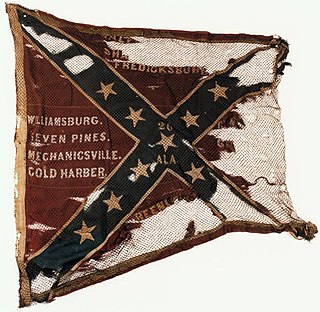
The 26th Alabama Infantry Regiment was an infantry regiment of the Confederate States Army regiment during the American Civil War. The regiment was composed of ten companies that came from various counties across Alabama. It is one of the few regiments that served both in the Army of Northern Virginia and Army of Tennessee.

James Harvey DeVotie (1814–1891) was a Baptist minister in the American South. Born in Oneida County, New York, he was a pastor in South Carolina, Alabama and Georgia. He was a co-founder of Howard College in Marion, Alabama, later known as Samford University near Birmingham. He was a long-time trustee of Mercer University in Macon, Georgia. He served as a Confederate chaplain during the Civil War. After the war, he worked for the Southern Baptist Convention.
William Reading Montgomery was a career United States Army officer who served in the Second Seminole War and Mexican–American War. He was a brigadier general in the Union Army from May 17, 1861, to April 4, 1864, during the American Civil War.
References
- 1 2 3 Henderson, Harris. "W. R. Houghton (William Robert), 1842-1906 and M. B. Houghton (Mitchell Bennett), 1845?-; Two Boys in the Civil War and After". Documenting the South. Retrieved February 7, 2024.